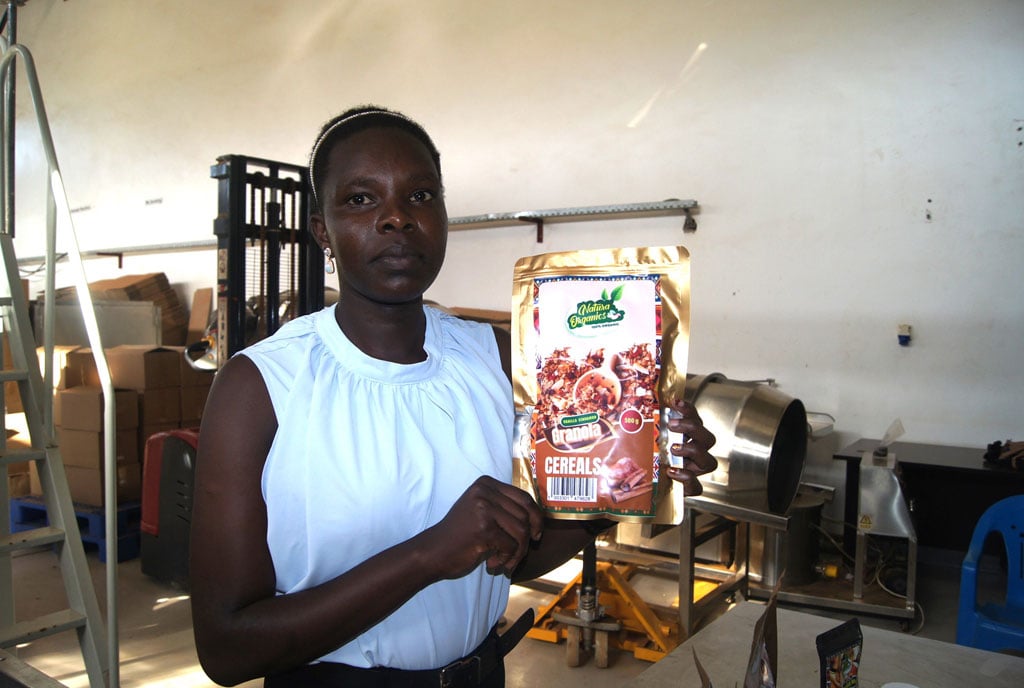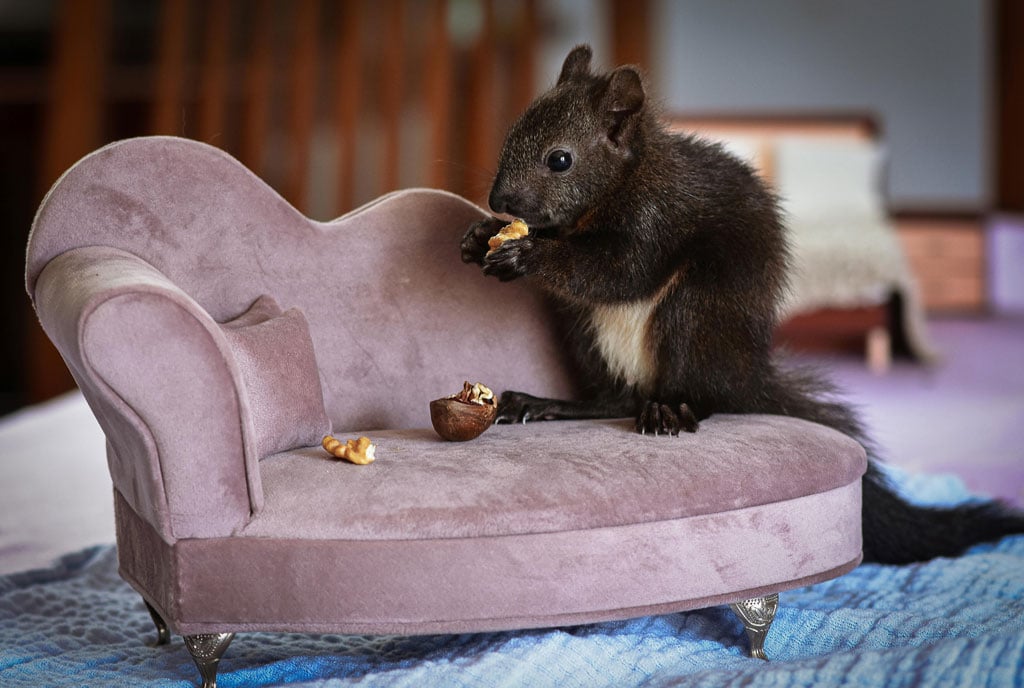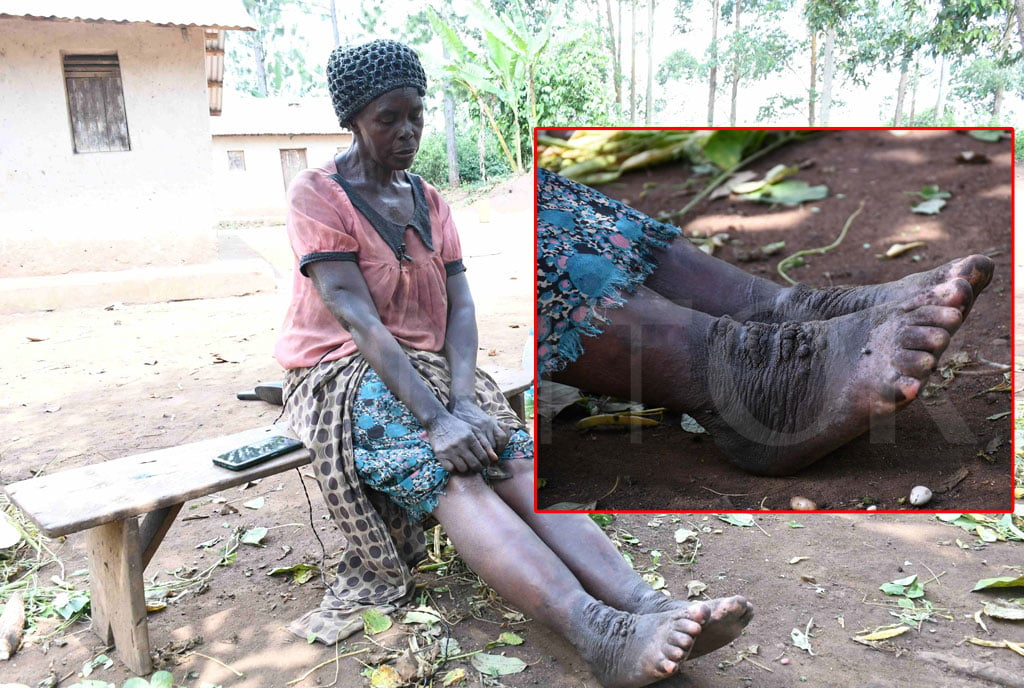
Willy Katumwa, a young innovator of the automated solar fish feeder. PHOTOs/George Katongole
Agriculture is Uganda’s most important export sector, contributing nearly half of the total exports. But the sector faces significant hurdles. Limited use of modern farming methods and post-harvest challenges for produce can significantly impact farmers’ income and contribute to food waste.
However, a new wave of young entrepreneurs is rising to the challenge, armed with innovative tech solutions designed to revolutionise the agricultural sector.
One such innovator is Samantha Ainembabazi, who has created a tech solution called “Freza.” This technology utilises nanotechnology to extend the shelf life of fruits by up to 30 days, eliminating the need for refrigeration.
Freza empowers farmers by allowing them to store their harvest for longer periods, significantly reducing spoilage and waste. This translates to increased income for farmers and contributes to a more sustainable food system.
Ainembabazi’s success story is not an isolated case. The AYuTe Africa Challenge, a competition specifically designed to empower young African entrepreneurs with technological solutions for agriculture, is playing a crucial role.
The Challenge has seen a diverse range of innovations which are awarded cash prizes for the past two years.
The “Smart Kuku Brooder” team based at Mbarara University of Science and Technology (MUST), for instance, developed an automated brooding system for chicks. This system, equipped with special infrared lights and data processors, optimises temperature control and chick survival rates, leading to healthier poultry farming practices.
Embracing technology
Despite its potential, Uganda’s agricultural production is currently operating at less than 40 percent of its capacity for key staple crops. This inefficiency highlights the need for innovative solutions.
During the recent launch of the AYuTe Africa Challenge season three in Kampala, young people were encouraged to reimagine the future of African agriculture.
A recent study by Heifer International, titled “The Future of Africa’s Agriculture,” found a growing interest in agriculture among young people, but lack of resources and support were significant barriers. This vital insight paved the way for the creation of the AYuTe (Agriculture-Youth-Technology) initiative.
William Matovu, Heifer International Uganda’s country director, emphasises the importance of innovative solutions. He has highlighted their potential to not only boost agricultural productivity by over 60 percent, but also reduce environmental impact and improve the livelihoods of farmers.

Samantha Ainembabazi, the lead innovator of Freza Nanotech which gives fruits longer shelf life. PHOTOs/George Katongole
The challenge
The AYuTe Africa Challenge is a competition focused on empowering young African entrepreneurs aged between 18-35 who are developing technological solutions for the agricultural sector across Africa. Launched in 2021 by Heifer International, the competition offers various awards to support the winners including cash grants, mentorship opportunities and business development resources.
“We realised that progress towards ending hunger wasn’t happening fast enough. Young people, who make up over 70 percent of Africa’s 1.3 billion population, needed to be at the forefront of this challenge. Our growing population wasn’t being matched by increased food production. While Africa has a young and energetic population, with over 24 percent of the land arable, the missing piece was technology. This realisation gave birth to the AYuTe Challenge, with the goal of creating job opportunities for young people and promoting efficient food production through technological innovation,” Matovu says.
The AYuTe Africa Challenge has become a launchpad for young innovators. Over the past two years, 443 young people have participated in the challenge.
Seven exceptional individuals have received a total of Shs120m to scale their inventions. These young entrepreneurs are also connected with other established innovator platforms like AYuTe Next Gen, providing them with valuable additional support.
This year, the challenge is expanding the reach with the introduction of a comprehensive incubation programme specifically designed for top finalists. Additionally, targeted campaigns are being rolled out to increase female participation in the challenge.
“We are ensuring the lasting impact of the AYuTe Challenge by supporting past winners through mentorship, business development services, and funding to scale their enterprises,” Matovu adds.
The launch event was graced by Mr Mondo Kyateka, the Commissioner of Youth and Children in the Ministry of Gender, Labour and Social Development.
Mr Kyateka applauded the AYuTe Challenge for its timely intervention in addressing the country’s challenges of youth unemployment, a growing youth population, and low technology adoption in agriculture.
“The focus on agriculture and digital innovation perfectly aligns with our national development goals. This approach directly contributes to food security and economic growth, as outlined in our National Development Plan III. To all the young innovators participating in this challenge, remember, every great innovation begins with a single idea. Your contributions have the potential to make a significant difference,” Mondo says.
Success story
Last year’s winner Samuel Okoci, 24 presented the kuku smart brooder, an automated brooding system with special infrared lights and data processor to the farmers’ phone. The brooder includes heat sensors that optimise heat in the brooder. The team of Okoci, Maureen Nayebare, Aaron Etyang, Peter Beinamaani and Frank Magezi Rubandamayonza was awarded Shs30m which they have used to scale production in Mbarara.
The Smart Kuku Brooder, redefines poultry farming in local households by automatically regulating temperature to provide optimal conditions for chick rearing.








